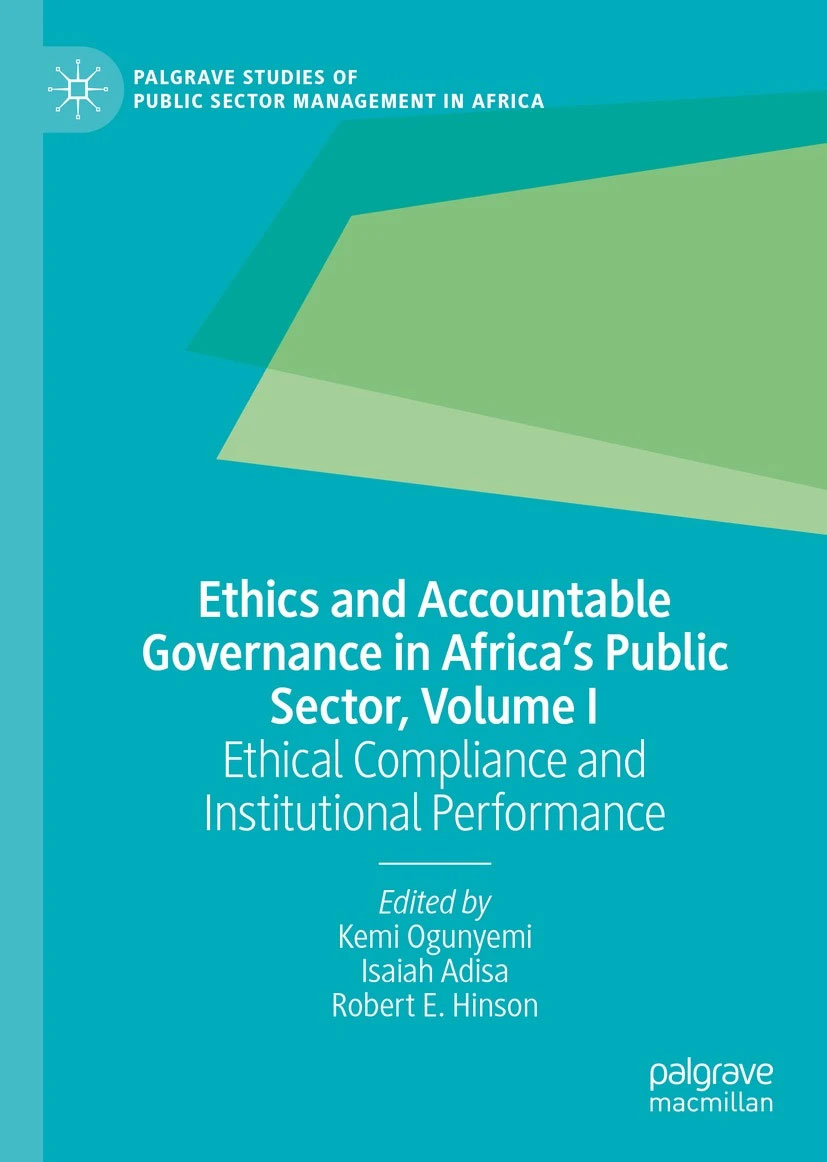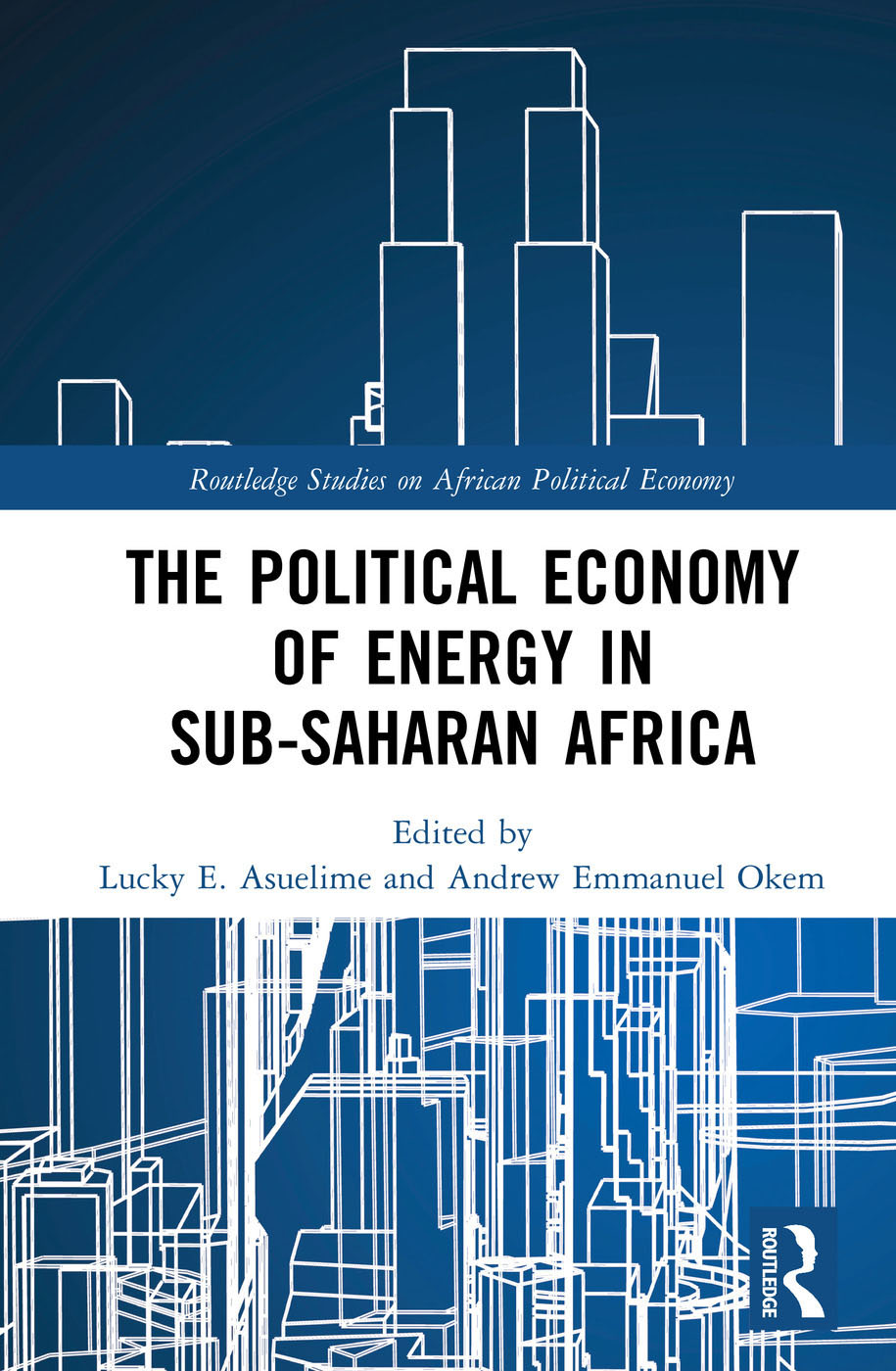 Ethics and Accountable Governance in Africa’s Public Sector, Volume One: Ethical Compliance and Institutional Performance. Edited by Kemi Ogunyemi, Isaiah Adisa, Robert E. Hinson, published by Palgrave Macmillan
Ethics and Accountable Governance in Africa’s Public Sector, Volume One: Ethical Compliance and Institutional Performance. Edited by Kemi Ogunyemi, Isaiah Adisa, Robert E. Hinson, published by Palgrave Macmillan
Ethics & Accountable Governance in Africa’s Public Sector Volume One explores accountable governance in Africa’s public institutions by examining the ethical issues affecting the management of public services and proffering solutions on the way forward.
Volume One is part of a series featuring articles and case studies by various researchers and governance experts from across the continent seeking to assist in improving public service delivery.
Literature on ethics and accountable governance in Africa has multiplied over the years due to an increase in the rate of unethical practices and heightened access to information afforded by social media and new technology. Subsequently, institutions in Africa are often depicted as corrupt due to gaps in governance, which in turn reflects a climate of unethical leadership.
A report by the United Nations Development Programme (UNDP) published in 2001 (and underscored in the book), titled ‘Public Service Ethics in Africa’, accentuated the following:
- African countries have values, standards, and laws against corruption, unethical acts, and incidents of maladministration. However, the laws are sometimes outdated and may not sufficiently cover technical developments or social trends.
- There are difficulties in applying existing specific anti-corruption laws due to the complexity of the text and the onerous burden of proof in a crime that is often not visible.
- The management and control of the conduct of public servants remain problematic.
- While many anti-corruption institutions have been moderately effective in fighting corruption and unethical behaviour, the lack of sufficient resources to adequately fulfil their mandates remains problematic.
- Prevention of outright corruption or the inadvertent violation of standards through ethics education, advice and/or counselling lacks sufficient attention.
- Governments need to enhance their transparency by sharing information about their activities.
Experts acknowledge that these findings indicate great opportunities to improve public sector efficiency. Yet, two decades later, due to poor governance and unethical cultures, the situation is no different. Additionally, when public service institutions underperform, private sector organisations fail to attain economic resilience, further jeopardising economic and sustainable development.
Articles in the book illustrate that the cornerstone of good governance is accountability, which involves answerability and enforcement. Regrettably, accountability in governance is lacking due to improper implementation and monitoring of public sector codes of ethics and behaviour. This means that public sector leaders must implement ethical and governance codes and likewise lead by example.
As the roots of ethical challenges are gradually uncovered and consciously addressed, ethics and accountability will seed better governance in public service, albeit amid a myriad of ongoing and complicated factors, including the Covid-19 pandemic, wicked problems, and the numerous costs in public service provision.
Another notable threat to ethics and governance emphasised in the book, which forms an integral part of corruption, is conflict of interest. Featured as empirical evidence, are eight high-profile conflicts of interest court cases that show how various governments responded.
For instance, in 1993 the Ghanaian government established a commission on human rights and administrative justice (CHRAJ), whose core mandate is to investigate conflicts of interest and abuse of public office.In 2013, CHRAJ passed a bill, the ‘Conduct of Public Officers Act, 2013’, which seeks to adequately address the problem of conflict of interest and its related corrupt practices. The Act also provides a code of conduct for public officers regarding the fulfilment of duties and similar matters such as ensuring that public officers declare their assets before assuming office and once every four years.
Despite such efforts, conflict of interest remains problematic in Ghana. Governance experts, therefore, have recommended using behavioural change approaches that apply social marketing principles and techniques to design effective interventions that elicit voluntary change in the attitude towards conflict of interest. In response, the CHRAJ initiated a two-month training programme for public officials and designed a human rights training manual for educators. The manual included education on anti-corruption as part of initiatives to instil integrity in the younger generation.
Closely linked to conflict of interest are nepotism, preferential hiring and prebendalism, which are all acts of partiality. Nepotism creates a conflict of interest in that the non-disclosure of a close relationship with an interviewee for employment results in a conflict of interest between employee and employer. Similarly, prebendalism is a system of political patronage employment.
Another issue rife with incidences of corruption is emergency-related procurement. Emergency procurement is a process meant to alleviate the effects of a natural or medical disaster. Relief and services procurement is prone to massive corruption because of the scale of resources needed and the demand for speedy disbursement. Government officials then see an opportunity to enrich themselves, their families, and their friends. The book cites several examples of disaster relief corruption.
The South African COVID-19 emergency stimulus package estimated at R500 billion (about $27 billion), nearly 10% of the country’s annual GDP, was alleged to have been subject to massive procurement corruption estimated at R14 billion. This massive looting happened despite clear guidelines for ethical conduct such as the Code of Ethics for parliamentarians and the Code for Good Conduct for public servants and a national treasury directive for procurement under the COVID-19 lockdown. Fortunately, South Africa took a stance against COVID-19 procurement corruption by instigating investigations, some of which resulted in arrests and the recovery of funds.
Other cases of disaster management corruption cited include the Ebola virus outbreak between 2013 and 2016 in Guinea, Sierra Leone, and Liberia. In that region there was widespread diversion of funds and medical supplies, misreporting of salaries and payments for goods, petty bribery to bypass containment measures such as roadblocks and quarantined zones, and flawed and opaque procurement processes. Evidence of fraud in both Guinea and Sierra Leone included fake billing by customs clearance service providers and inflated prices for relief items, which led to a potential loss of CHF 6 million (about $6.5 million).
Evidently, Africa faces enormous challenges in the quest for good governance. The change in public sector ethos and service delivery must start with the leaders of public service institutions, creating systems that castigate unethical practices by implementing policies that encourage morality and by punishing erring public officials. Ultimately, the book clearly states the urgency required to improve ethics and accountability in public service institutions if the continent is to achieve its developmental goals and improve the quality of life of its people.
Sarah Nyengerai is an academic and freelance writer based in Zimbabwe with a strong passion for social, cultural, economic and political issues that affect women. She believes literary works form the foundation for the dialogue required to sustain momentums of change and aims to bring attention to such matters. A member of NAFSA (Association for International Educators) and Forum for African Women Educationalists (FAWE), Sarah is actively involved in the advancement of education for women.












